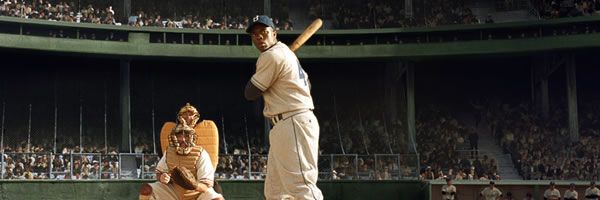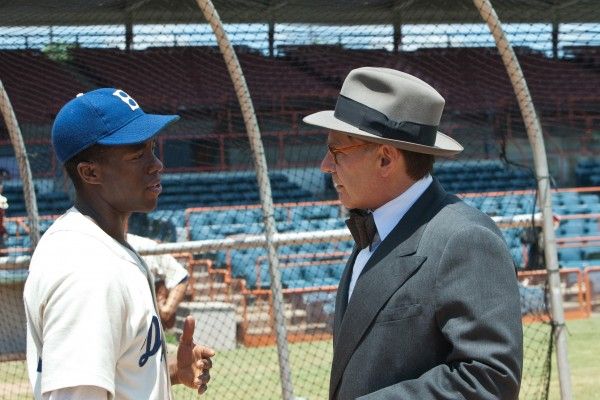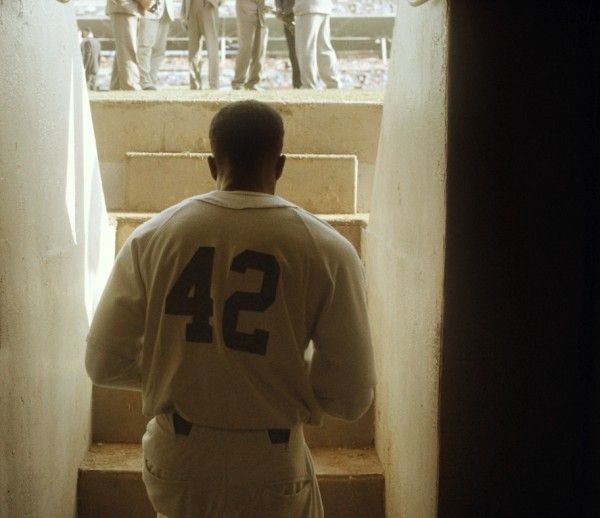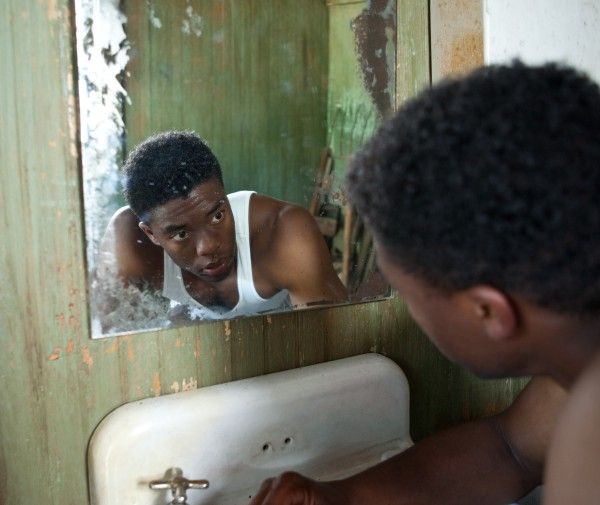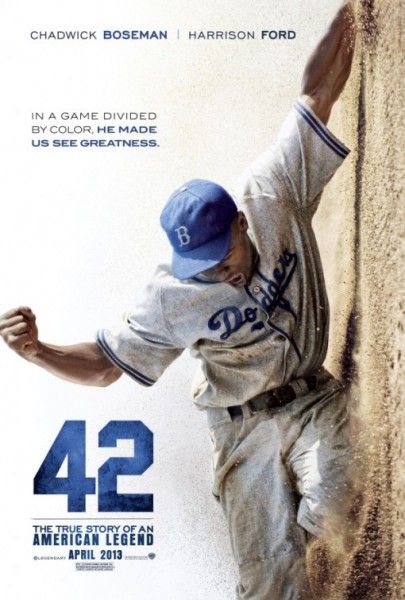Football may currently be the most popular sport in America, but baseball will always be "America's Pastime". It was our first widely popular sport, and it contained both the best of our abilities and the worst of our perceptions. Segregation in baseball was never official. It was an unwritten rule agreed upon by the owners and "enforced" by the commissioner. Baseball, in its rules, is a pure sport, but in its practice, was tainted by institutional racism. Jackie Robinson didn't just break the color barrier in a sport; he completed the greatness of America's Pastime. He is a transformative figure, and in 42, writer-director Brian Helgeland pays complete and utter devotion to Robinson's legend. Strangely, despite his attempt to paint Robinson's accomplishment as a mythic battle between good and evil, the story never feels larger than a TV movie.
In 1945, Branch Rickey (Harrison Ford), general manager of the Brooklyn Dodgers, decides that the team will break the color barrier and hire a black player because it will boost ticket sales, although there's a strong hint that Rickey also has magnanimous motives. The team settles on Jackie Robinson (Chadwick Boseman) even though he has a short-fuse. Rickey believes that Robinson's "hard" attitude and tremendous athletic abilities will make the young player the ideal figure to weather the hatred that will be thrown his way. From there, the film follows Robinson through the minor leagues and his first year with the Dodgers. Along the way, he endures virulent racism but ultimately triumphs.
You know the story, and Hegleland doesn't have much to add. The involvement of Rickey may be new information to some, but the movie eventually gets caught in loop where we see Robinson struggle to avoid retaliating against his aggressors, and white people coming to realize that they can accept a black baseball player without the world coming to an end. There's no room for nuance or shades of gray because this is The Legend of Jackie Robinson, and 42 is a glowing tribute.
Normally, I can't stand biopics that are hagiographies. They take regular people and put them so far above us that all the humanity gets lost in the telling. 42 presents the rare exception because there will never be another Jackie Robinson. You can seek to emulate his ability to endure the hatred thrown his way, but what he accomplished will never be repeated. He managed to play baseball at the highest level and, more importantly, tear down the widespread and insidious perception African-Americans. There were probably a few players in the Negro Leagues who were slightly better than Robinson when it came to baseball, but Rickey was right when it came to getting the personality who wasn't soft, but could still restrain himself when perhaps no one else could.
The purity of baseball also accommodates this unvarnished tribute to Robinson. As one of the talking heads says in Ken Burns' Baseball, it's the only major sport that isn't determined by a clock. In theory, we control our destiny until the very last out no matter what the score may be. There's no "garbage time" in baseball. There's always a chance to right the ship if we're willing to keep fighting. That level of perseverance against insurmountable odds is one of the many reasons why I love baseball, and it's also a good metaphor for the character of Jackie Robison.
Hegleland's constant testament to the power of Robinson's accomplishment may be fitting, but the film can't help but feel small despite the director's celebratory approach. Robinson is crafted in the mold of a superhero—he reluctantly answers the call of the wise old sage, dons his iconic uniform, and defeats a symbol of racial injustice. But these trappings ultimately feel hokey. The movie is bathed in a golden light, and with a few exceptions, people are cast as completely good or completely evil. This is best represented in the cartoonish and vile Phillies manager Ben Chapman (Alan Tudyk). Even if it was historically true that Chapman let out an endless string of racial epithets every time Robinson came to the plate, the on-screen execution is simply too over the top to take seriously. It's an evil trying to be at the same level of Robinson's good, but it reduces racism to clownishness. Racism is inherently ridiculous—the perception that a person's character is based solely on their skin color—but it shouldn't be unintentionally funny, and Robinson's achievement is lessened when placed against an act that feels unbelievable even if it actually happened. It's also unnecessary since Helgeland accomplishes the same goal at another point in the film where we see a child in the stands emulate his father's racism when Robinson comes to the plate.
Robinson's story is a big journey placed inside a limited approach. He's a larger figure than his own movie. It doesn't help that it's a movie without movie stars aside from Harrison Ford. Boseman is terrific, and does justice to his epic role, but he's not the famous face we associate with people of Robinson's historical stature. The rest of the cast is filled with faces from TV including Christopher Meloni (Law & Order: SVU), Hamish Linklater (The New Adventures of Old Christine), Derek Phillips (Friday Night Lights), Ryan Merriman (Pretty Little Liars), and T.R. Knight (Grey's Anatomy). That's not to say they're bad actors, but we associate them with television rather than movies.
They're also stuck playing cardboard characters who make the predictable move from being either racist or ambivalent to openly embracing Robinson. The grand irony is that the great triumph of Jackie Robinson was forcing people to look past black and white, and making them see that personal character and ability transcended race. 42 only sees the world in good and evil, and while it pays a loud and glorious tribute to Robinson, the film rarely does justice to his accomplishment.
Rating: C+

